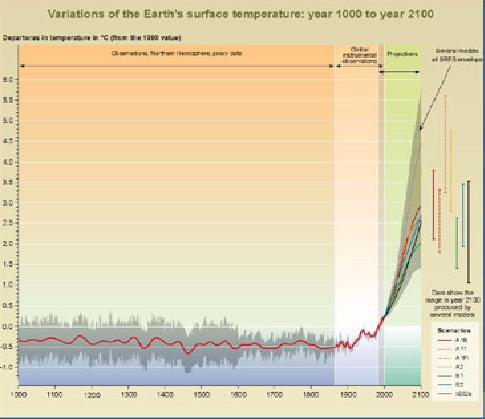
Environmental and Energy Business Resources
...everything environmental and energy...
Understanding Climate Change
Weather, Climate and Climate Change
Weather is the state or condition of the atmosphere (measured in terms of the atmospheric variables such as temperature, humidity, air pressure, moisture, wind, cloudiness, precipitation (rainfall and snow) and sunshine) at a given time and place. Weather changes from hour-to-hour, day-to-day, and season-to-season. The changes in weather occur with the movement of air over the earth surface and the resultant redistribution of heat and moisture.
Climate is the condition of the atmosphere (in terms of averages or the extreme values (minimum and maximum) of the atmospheric variables such as temperature) at a given location measured over a period of time. The time period can be a decade or longer.
Climate is the expected, while weather is what you get.
Climate Change and Global Warming
Climate Change is the observed differences in the averages or extreme values (minimum and maximum) of the atmospheric variables, such as temperature, of a place when computed over two or more time periods. The time period can be about a decade or longer. If there is are differences in the values of the atmospheric variables observed at a point between say, two - ten year periods, then climate change is occuring, Otherwise climate is said to be constant. The atmospheric variable commonly referenced in climate change discussions is the temperature in degree celsius (°C) or degree Fahrenheit (°F)
Variations of the earth's surface temperature: year 1000 to 2100 (Source: IPCC - Climate Change 2001 Synthesis Report)
Global warming is the warming up of the planet caused by climate change. According to The Intergovernmental Panel on Climate Change (IPCC), since the time of the industrial revolution in the 1700-1800, the average temperature of the Earth’s surface rose to approximately 1°C in 2017 and will continue to increase at the rate of 0.2°C every decade. The IPCC researchers conclude that the greenhouse gas emissions generated when we burn fossil fuels (coal, oil, and gas) for our industrial activities cause the temperature rise the lead to climate change and global warming. Global warming has bad effects on oceans, weather, food and health. Sea level rises cause flooding which can submerge low-lying cities. Extreme weather makes harvesting difficult and could lead to food shortages. People’s health could also be affected as there will be higher levels of smog which can cause asthma, heart disease and lung cancer.
Other relevant contents to this page include:
Ten sure ways to save on your home energy bill and help reduce global warming
All Information on our website are free for your use. You are required to reference our website each time you use our materials. Please link back to: Environmental and Energy Business Resources using website address: http://www.environbusiness.com.


